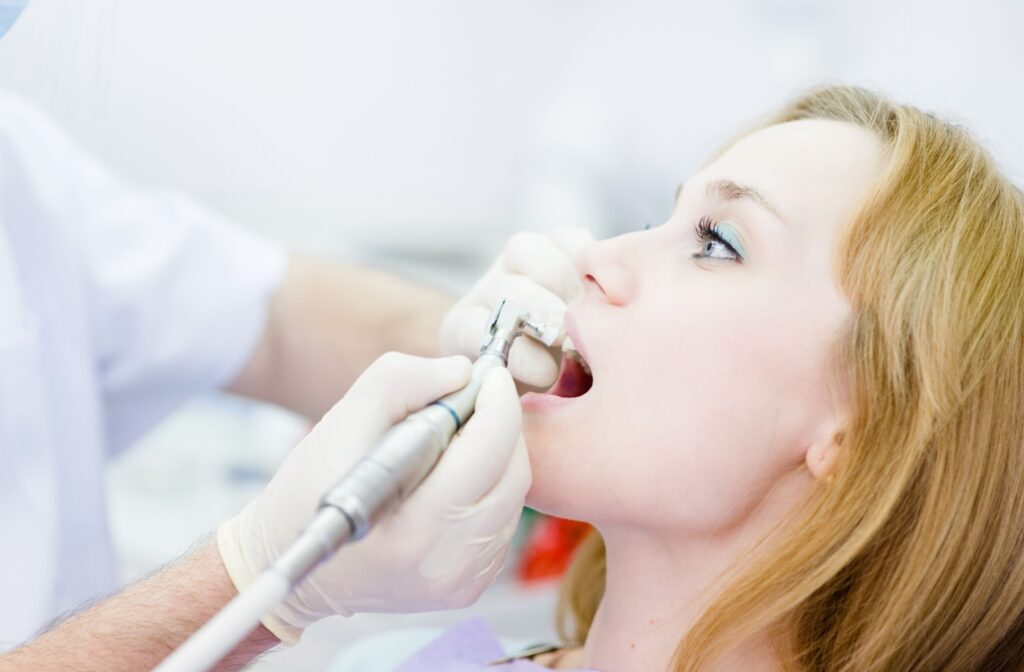Understanding gum disease and its stages is essential for maintaining a healthy smile and overall well-being. Often an invisible enemy, gum disease can quietly wreak havoc in your mouth if not properly managed. It may be tempting to try and deal with gum disease on your own, but it cannot be cured without a dentist, especially if it progresses to the severe stages.
Gum disease can lead to severe complications like tooth loss, bone damage, and even an increased risk of heart disease. So, involving your dentist to prevent costly and extensive future treatments is critical.
Understanding Gum Disease & Its Stages
Gum disease, also known as periodontal disease, is an inflammation of the gums that can progress to affect the bone supporting your teeth. It’s like an invisible enemy lurking in your mouth, ready to cause harm if left unchecked. The stages of gum disease range from mild to severe.
Gingivitis is the earliest stage, marked by red, swollen gums that might bleed easily. Fortunately, it’s usually reversible with good oral hygiene and professional cleaning. But if left unchecked, gingivitis can advance to periodontitis, where the inner layer of the gum and bone pull away from the teeth, forming pockets that can become infected.
Advanced periodontitis is the most severe stage, where the fibres and bone supporting your teeth are destroyed. This can lead to teeth becoming loose and may require removal. Understanding these stages is crucial for prevention and treatment.
The Importance of Early Detection & Prevention
Prevention is always easier and more cost-effective than cure, and this couldn’t be truer for gum disease. Early detection and intervention can halt the progression of the disease, saving you from extensive and expensive treatments down the line.
Regular dental visits are your first line of defence. According to the Canadian Dental Association, you should see your dentist every 6 months. But you should follow your dentist’s recommendations for frequency, as they consider your unique situation.
Your dentist can spot early signs of gum disease and provide professional cleanings to remove plaque and tartar. They can also offer personalized advice on improving your oral hygiene routine.
Good oral hygiene at home is equally important:
- Brush at least twice daily
- Floss at least once daily or after every meal
- Use an alcohol-free antibacterial mouthwash
A balanced diet rich in vitamins and minerals will also support your gum health. By taking these preventive measures, you can give your gums their best chance at staying healthy.
Complications of Untreated Gum Disease
Untreated gum disease, or periodontal disease, can lead to many serious health complications. Here are some of the most significant risks.
Tooth Loss
Gum disease is a leading cause of tooth loss in adults. As the disease progresses, it can destroy the bone and tissues that support the teeth, ultimately causing teeth to become loose and fall out.
Bone Damage
The inflammation and infection associated with advanced gum disease can erode the jawbone, leading to significant bone damage. This condition affects oral health and can alter the shape of your face and smile.
Increased Risk of Heart Disease
Research has shown a strong connection between gum disease and cardiovascular problems. The bacteria from infected gums can enter the bloodstream, contributing to plaque formation in the arteries and increasing the risk of heart disease and stroke.
Respiratory Issues
Oral bacteria from gum disease can be inhaled into the lungs, potentially causing respiratory infections or exacerbating existing conditions like chronic obstructive pulmonary disease (COPD) and pneumonia. Prevention and treatment of gum disease can lessen one’s risk of respiratory complications.
Professional Gum Disease Treatment
Good oral hygiene is instrumental in reversing the early stages of gum disease. But it’s crucial to involve your dentist in the treatment.
Professional Cleaning
A professional cleaning can often reverse the condition in the early stages of gum disease:
- Scaling: This involves gently removing the plaque and tartar from your teeth and around your gum line.
- Root planing: This smooths out the roots of your teeth, helping your gums reattach to your teeth.
Medications
Depending on the severity of the gum disease, your dentist might prescribe medications to help control infection and reduce inflammation. These can include:
- Antibiotic gels or mouth rinses: These are applied directly to the gums.
- Oral antibiotics: These may be necessary for more severe infections.
Surgical Treatments
Surgical interventions might be required for more advanced cases of gum disease:
- Flap surgery: The gums are lifted back, and the tartar is removed. The gums are then sutured back in place so they fit snugly around the teeth.
- Bone grafts: If bone has been destroyed by gum disease, bone grafts can replace it. This helps support the regeneration of natural bone.
- Soft tissue grafts: Tissue is taken from another part of your mouth or a donor and attached to the affected area to reinforce thin or receding gums.
Book an Appointment with Us Today
Gum disease isn’t something to mess around with, and it’s crucial you deal with it. Ideally, prevention is the best-case scenario, but that’s not always possible. Call our professional team at Genesis Dental if you notice any signs of gum disease developing. We’re happy to get you in to see one of our experienced dentists to develop a tailored treatment plan.




